| Sebastian Hahner Receives KIT Doctoral Award 2025 for Outstanding Dissertation Dr.-Ing. Sebastian Hahner has been honored with the 18th KIT Doctoral Award of the year 2024/2025 for his outstanding doctoral thesis titled “Architecture-Based and Uncertainty-Aware Confidentiality Analysis.” Congratulations! Link to the KIT Doctoral Award |
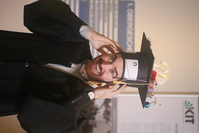 New PhD: Dr.-Ing. Timur Sağlam New PhD: Dr.-Ing. Timur SağlamDr.-Ing. Timur Sağlam successfully defended his thesis “Mitigating Automated Obfuscation Attacks on Software Plagiarism Detection Systems.” Congratulations! Timur Sağlam's Page |
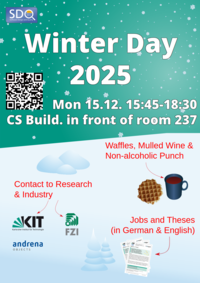 SDQ Winter Day 2025 SDQ Winter Day 2025On Monday, December 15th, the SDQ Winter Day 2025 will take place, starting at 15:45 at the Infobau (building 50.34) in front of room 237. There, the research groups MCSE (KASTEL Koziolek), DSiS (KASTEL Reussner), and SASIS (KASTEL Mirandola) will present themselves to interested students. In addition to presentations from research and industry, there will be free mulled wine, non-alcoholic punch, and waffles. There is also the opportunity to discuss thesis topics with members of the groups. More information about the program can be found at https://sdq.kastel.kit.edu/wiki/SDQ_Winter_Day SDQ Wiki Winter Day Page |
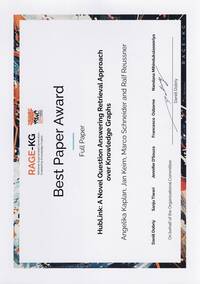 Best Paper Award for DSiS members at RAGE-KG@ISWC25 Best Paper Award for DSiS members at RAGE-KG@ISWC25The paper titled "HubLink: A Novel Question Answering Retrieval Approach over Knowledge Graphs" by Angelika Kaplan, Jan Keim, Marco Schneider, and Ralf Reussner was praised as exceptional contribution and awarded best paper in the full paper category at the workshop for Retrieval-Augmented Generation Enabled by Knowledge Graphs (RAGE-KG) at the ISWC 2025. In their paper, the authors introduce HubLink, a schema-agnostic and training-free approach for Question Answering over Knowledge Graphs that uses large language models to improve scholarly search and source-aware inference. Evaluated on the Open Research Knowledge Graph, HubLink outperforms state-of-the-art baselines, particularly for complex scholarly queries. Link to the paper |
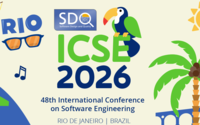 SDQ publication at ICSE 2026 SDQ publication at ICSE 202620 October 2025
We are happy to share that our paper “Same Same But Different: Preventing Refactoring Attacks on Software Plagiarism Detection” by Robin Maisch, Larissa Schmid, Timur Sağlam, and Nils Niehues has been accepted for presentation at the International Conference on Software Engineering (ICSE) 2026. The work addresses a longstanding challenge in academic integrity: the vulnerability of source code plagiarism detection tools to refactoring-based obfuscation. The authors introduce Nocte, an extensible framework that leverages graph transformations on code property graphs to normalize code structure. This approach significantly strengthens the resilience of plagiarism detection systems against structural modifications often used to conceal copied code. Congratulations to all authors on this excellent achievement! ICSE 2026 homepage |
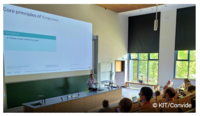 Keynote by Dr. Erik Burger Keynote by Dr. Erik BurgerConvide PI Dr. Erik Burger gave a keynote on 12 June 2025 titled „Consistency in the View-Based Development of Cyber-Physical Systems“ at the 18th International Conference on Graph Transformation (ICGT). In his talk, he demonstrated the significance of model-driven technologies for improving the adaptability, reliability, and security of modern CPS. Convide website |
 SE25: Registration now open SE25: Registration now openThe Software Engineering Conference SE2025, organized by the Software Engineering division of the German Informatics Society (GI), will take place at KIT from February 24 to February 28, 2025. The registration is now open. Further information can be found on the conference website: https://se2025.sdq.kastel.kit.edu/. Organizing Committee: Anne Koziolek (General Chair), Anna-Lena Lamprecht, Thomas Thüm (Program Chairs), Sascha Alpers (Industry Chair), Lisa Sonnleithner, Kevin Feichtinger (Workshop Chairs), Ralf Reussner (Sponsoring Chair), Jan Keim (Local Chair), Tobias Hey (Publicity Chair), Erik Burger (Proceedings Chair) SE 2025 website |
 Dr.-Ing. Sebastian Hahner successfully passed his doctoral defense with highest honors. Dr.-Ing. Sebastian Hahner successfully passed his doctoral defense with highest honors.Dr.-Ing. Sebastian Hahner successfully passed his doctoral defense with highest honors. The title of his dissertation was “Architecture-Based and Uncertainty-Aware Confidentiality Analysis”. |
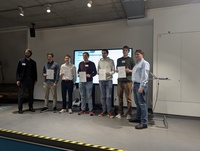 VKSI Award 2024 VKSI Award 2024At the ceremony of the VKSI award 2024, SDQ members and students received one award and two honorable mentions: Nils Niehues received the VKSI award for his master’s thesis “Intelligent Match Merging to Prevent Obfuscation Attacks on Software Plagiarism Detectors”, supervised by Timur Sağlam and Sebastian Hahner. Honorable mentions were awarded to Tom Hüller for his thesis “Automated Consistency of Legal and Software Architecture System Specifications for Data Protection Analysis”, supervised by Nicolas Boltz and Sebastian Hahner, and to Moritz Brödel for his final thesis “Preventing Automatic Code Plagiarism Generation Through Token String Normalization”, supervised by Timur Sağlam and Sebastian Hahner. VKSI homepage |
 SDQ Winter Day 2024 SDQ Winter Day 2024On Monday, December 16th, the SDQ Winter Day 2024 will take place, starting at 15:45 at the Infobau (building 50.34) in front of room 325. There, the research groups MCSE (KASTEL Koziolek), DSiS (KASTEL Reussner), and SASIS (KASTEL Mirandola) will present themselves to interested students. In addition to presentations from research and industry, there will be free mulled wine, non-alcoholic punch, and waffles. There is also the opportunity to discuss thesis topics with members of the groups. More information about the program can be found at https://sdq.kastel.kit.edu/wiki/SDQ_Winter_Day. SDQ Wiki Winter Day page |
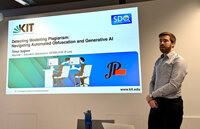 Timur Sağlam Keynote Speaker at MODELS 2024 EduSym Timur Sağlam Keynote Speaker at MODELS 2024 EduSym24 September 2024
Timur Sağlam gave a keynote at the MODELS 2024 Educators Symposium on the topic Detecting Modelling Plagiarism: Navigating Automated Obfuscation and Generative AI. The international symposium took place at Johannes Kepler University in Linz, Austria, and was attended by educators, researchers and practitioners from the modelling community. An active discussion after the keynote gave these participants the possibility to exchange insights on the topic of plagiarism detection and teaching model-driven engineering. Keynote abstract and slides |
 Three Papers by SDQ at ICSE 2024 Three Papers by SDQ at ICSE 202421 December 2023
Three papers by SDQ members have been accepted at next year's ICSE conference: Timur Sağlam, Moritz Brödel, Larissa Schmid, Sebastian Hahner: Detecting Automatic Software Plagiarism via Token Sequence Normalization (Research Track) URL Jan Keim, Sophie Corallo, Dominik Fuchß, Tobias Hey, Tobias Telge, Anne Koziolek: Recovering Trace Links Between Software Documentation And Code (Research Track) Pre-Print Timur Sağlam, Larissa Schmid, Sebastian Hahner, Erik Burger: Automated Detection of AI-Obfuscated Plagiarism in Modeling Assignments (Software Engineering Education and Training Track) URL ICSE 2024 website |
 SDQ Winter Day 2023 SDQ Winter Day 2023On December 7, the SDQ Winter Day will take place starting at 3:45 pm at the Infobau (50.34) in front of room 325. In addition to presentations from research and industry, there will be free mulled wine, punch and waffles. There is also an opportunity to discuss thesis topics with members of the group. More information about the program can be found at: https://sdq.kastel.kit.edu/wiki/SDQ_Winter_Day. |
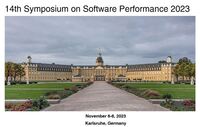 SSP 2023 SSP 20236 November 2023
The Symposium on Software Performance (SSP) brings together researchers and practitioners interested in software performance, where "performance" is understood both in a classical sense as "the amount of useful work accomplished by a software system compared to the time and resources used", as well as in a broader sense as "the manner in which or the efficiency with which a software system reacts or fulfills its intended purpose". The scope of SSP spans measurement, modeling, benchmark design, and run-time management. The focus is both on classical performance metrics such as response time, throughput, and resource utilization, as well as on the relationship of such metrics to other software quality attributes including but not limited to scalability, elasticity, (energy) efficiency, dependability (in terms of availability and reliability), resilience, security, and privacy. Topics of interest include the design of metrics, benchmarks, and tools for quantitative system evaluation and analysis, as well as the development of methodologies, techniques and tools for modeling, measurement, load testing, monitoring, profiling, workload characterization, and run-time management of software systems with respect to the mentioned quality attributes. This year we celebrate 20 years of Palladio. We will look back at the beginnings of Palladio, reflect the current developments and plan the future of Palladio. SSP 2023 is supported by the GI special interest group "Softwaretechnik". SSP 2023 homepage |
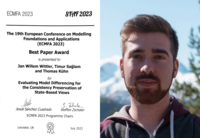 Best Paper Award for Jan Wittler, Timur Sağlam and Thomas Kühn at ECMFA 2023 Best Paper Award for Jan Wittler, Timur Sağlam and Thomas Kühn at ECMFA 202320 July 2023
Timur Sağlam and former DSiS members Jan Wittler and Thomas Kühn have received the Best Paper award at the 19th European Conference on Modelling Foundations and Applications (ECMFA) for their paper “Evaluating Model Differencing for the Consistency Preservation of State-Based Views“. In their work, the researchers have developed a correctness notion for changes to models in the context of model-view consistency. This is an important contribution for consistency in the development of Cyber-Physical Systems, a topic which is in the focus of research at DSiS. Paper at Journal of Object Technology (JOT) |
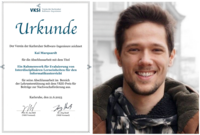 VKSI Award for Kai Marquardt VKSI Award for Kai Marquardt21 June 2023
The award has been given to a member of the Institute of Information Security and Dependability (KASTEL). The association of software engineers in Karlsruhe (Verein der Karlsruher Software-Ingenieure e.V./VKSI) awards students for excellent bachelor’s and master’s theses every year. This year, Kai Marquardt (from the group Modelling for Continuous Software Engineering, Prof. Anne Koziolek) receives the VKSI award for an excellent master thesis https://publikationen.bibliothek.kit.edu/1000143548 on youth development and teaching in informatics. In his thesis, he introduces an innovative approach to introduce and motivate topics of informatics through interdisciplinary online courses with the goal to engage young students, especially young women, in the subject. Results of the master thesis have been presented at the prestigious ICSE conference paper https://publikationen.bibliothek.kit.edu/1000155705.
|
 CRC 1608 »Convide« granted CRC 1608 »Convide« granted23 May 2023
Modern cyber-physical systems (CPS), such as cars or production plants, are full of electronic and mechanical components that are controlled by software. The system as a whole can only function if all these parts interact perfectly. Designing such systems poses the challenge of keeping the system architecture consistent att all times. New methods will be developped in a Collaborative Research Center (Sonderforschungsbereich) Consistency in the View-Based Development of Cyber-Physical Systems (Convide) at KIT, with a budget of 11 million € over four years. Prof. Ralf Reussner is the speaker of this CRC, with members coming from the faculties of Informatics, Electrical Engineering as well as Mechanical Engineering. Furthermore, TU Munich, TU Dresden, and the University of Mannheim will participate in the CRC. Homepage of CRC 1608 |
 New PhD: Dr.-Ing. Max Scheerer New PhD: Dr.-Ing. Max Scheerer9 May 2023
Dr.-Ing. Max Scheerer successfully passed his defense with highest honors. His dissertation has the title Evaluating Architectural Safeguards for Uncertain AI Black-Box Components and is available in KITopen. Publication in KITopen |
 New paper in Journal of Systems & Software New paper in Journal of Systems & Software26 July 2022
The paper entitled "Scalability Testing Automation using Multivariate Characterization and Detection of Software Performance Antipatterns" by DSiS members Robert Heinrich, Martina Rapp, Jörg Henß and collaboration partners from eSulab Solutions, Ericsson AB, Blekinge Institute of Technology, Gran Sasso Science Institute, Free University of Bozen-Bolzano, and University of Hamburg has been published in the Journal of Systems & Software. Paper at Journal of Systems and Software (JSS) |
 New PhD: Dr.-Ing. Sofia Ananieva New PhD: Dr.-Ing. Sofia Ananieva1 July 2022
Dr.-Ing. Sofia Ananieva successfully passed her defense with highest honors. |
 Most Influential Paper Award for Thomas Goldschmidt, Steffen Becker, and Erik Burger Most Influential Paper Award for Thomas Goldschmidt, Steffen Becker, and Erik Burger30 June 2022
Thomas Goldschmidt, Steffen Becker, and Erik Burger received the Most Influential Paper Award for their 2012 paper "Towards a tool-oriented taxonomy of view-based modelling". The award was presented at the conference MODELLIERUNG 2022 of the German Informatics Society (GI). The paper can be accessed via the GI digital library: https://dl.gi.de/handle/20.500.12116/18148 |
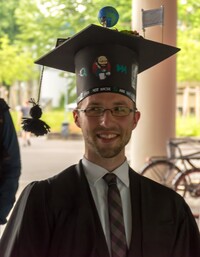 New PhD: Dr.-Ing. Stephan Seifermann New PhD: Dr.-Ing. Stephan Seifermann23 May 2022
Dr.-Ing. Stephan Seifermann successfully passed his defence on 23 May 2022. His dissertation on "Architectural Data Flow Analysis for Detecting Violations of Confidentiality Requirements" is available online: https://publikationen.bibliothek.kit.edu/1000148748 |
 Bunte Nacht der Digitalisierung 2022 Bunte Nacht der Digitalisierung 2022Freitag, 1. Juli 2022 ab 16:30 Uhr im Informatikgebäude 50.34 (Am Fasanengarten 5), Raum –101 (Gerhard-Goos-Hörsaal) Unter dem Thema "Software-Entwurf und Qualität" stellen sich die Forschungsgruppen für Zuverlässige Software-intensive Systeme und Modellierung für kontinuierliche Software-Entwicklung des KASTEL Instituts für Informationssicherheit und Verlässlichkeit vor. Wir laden Sie zu einem vielseitigen Programm ein, indem sich die Forschungsgruppen, ihre vielfältigen Forschungsgebiete sowie ihre Industriepartner vorstellen. Bei Getränken und Snacks wird hier allen Gästen ein direkter Einblick in die Forschung und Praxis der Software-Entwicklung geboten. Studierende können zusätzlich Kontakt zu Betreuerinnen und Betreuern zukünftiger Abschlussarbeiten knüpfen und ihr Interesse an der Erforschung und Verbesserung der Software-Entwicklung wecken lassen. Detailliertes Programm |
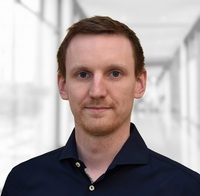 Heiko Klare is awarded the "Baden-Württemberg Certificate" for university didactics (HDZ) Heiko Klare is awarded the "Baden-Württemberg Certificate" for university didactics (HDZ)01 December 2021
DSiS employee Heiko Klare received the "Baden-Württemberg Certificate" for university didactics ("Baden-Württemberg-Zertifikat für Hochschuldidaktik"). It certifies the participation at workshops, supervisions, practical coaching and individual qualification measures with a total amount of 200 teaching units. Heiko Klare specialized in developing concepts for e-learning and e-assessments. In this year, the certificates have been awarded without a formal handover. |
 New paper in Journal of Systems & Software New paper in Journal of Systems & Software19 November 2021
The paper entitled "Detecting Violations of Access Control and Information Flow Policies in Data Flow Diagrams" by Stephan Seifermann, Robert Heinrich, Dominik Werle and Ralf Reussner has been published in the Journal of Systems & Software. The paper is about considering confidentiality in early software designs given as data flow diagrams. The presented approach allows designers to model and analyze systems using various commonly used confidentiality policies. The paper is an open access publication. Access Paper |
 New publication in Software and Systems Modeling New publication in Software and Systems Modeling13 October 2021
New journal paper in Software and Systems Modeling by SDQ member Robert Heinrich and Moussa Amrani, Dominique Blouin, Arend Rensink, Hans Vangheluwe and Andreas Wortmann on Multi-paradigm modelling for cyber–physical systems. The paper "Multi-paradigm modelling for cyber–physical systems: a descriptive framework" by Moussa Amrani, Dominique Blouin, Robert Heinrich, Arend Rensink, Hans Vangheluwe and Andreas Wortmann has been published in Software and Systems Modeling volume 20 and will be presented as a journal-first paper at the ACM/IEEE 24th International Conference on Model Driven Engineering Languages and Systems (MODELS). Access paper |
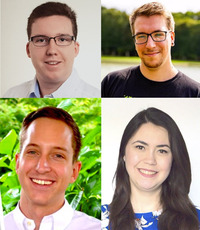 VKSI awards and honorable mentions for KASTEL members VKSI awards and honorable mentions for KASTEL members10 August 2021
Two awards and two honorable mentions have been given to members of the Institute of Information Security and Dependability (KASTEL). The association of software engineers in Karlsruhe (Verein der Karlsruher Software-Ingenieure e.V./VKSI) award students for excellent bachelor’s and master’s theses every year. This year, Larissa Schmid (from the group Modelling for Continuous Software Engineering, Prof. Anne Koziolek) receives the VKSI award for an excellent thesis on foundations of software engineering. Her master’s thesis has the title "Modeling and Simulation of Message-Driven Self-Adaptive Systems". Sebastian Hahner (from the group Dependability of Software-intensive Systems, Prof. Ralf Reussner) receives the award for an excellent thesis in applied software engineering. His master’s thesis has the title "Domain-specific Language for Data-driven Design Time Analyses and Result Mappings for Logic Programs". Honorable mentions for their final theses go to Dominik Fuchß and David Monschein. VKSI homepage |
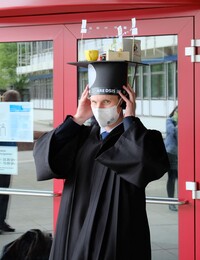 New PhD: Dr.-Ing. Heiko Klare New PhD: Dr.-Ing. Heiko Klare19 May 2021
Dr.-Ing. Heiko Klare successfully passed his defence with highest honors. Photo by Dominik Werle His dissertation on "Building Transformation Networks for Consistent Evolution of Interrelated Models" is available online. KITopen |
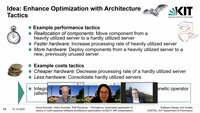 ICSA ’21 10-years Most Influential Paper Award will be presented to Anne Koziolek, Heiko Koziolek, and Ralf Reussner ICSA ’21 10-years Most Influential Paper Award will be presented to Anne Koziolek, Heiko Koziolek, and Ralf Reussner7 April 2021
The 18th International Conference on Software Architecture (ICSA'21) awarded the ICSA'21 10-years Most Influential Paper Award to the paper "PerOpteryx: automated application of tactics in multi-objective software architecture optimization" by Anne Koziolek, Heiko Koziolek, and Ralf Reussner. ICSA is the premier venue for practitioners and researchers interested in software architecture, in component-based software engineering and in quality aspects of software and how these relate to the design of software architectures. ICSA has a strong tradition as a working conference, where researchers meet practitioners and software architects can explain the problems they face in their day-to-day work and try to influence the future of the field. ICSA 2021 Homepage |
Workshop on Properties of Software Engineering Research (PROPSER) 2021First International Workshop on Properties of Software Engineering Research (PROPSER)AimThis workshop aims to bring together researchers at various points in their career and practitioner's alike, for discussing the systematic description and evaluation of software engineering research and their documentation. MotivationThe workshop is motivated by two observations: writing and reviewing software engineering research results is often hindered by the lack of a community understanding what are important questions (hypotheses) to validate research and which methods are suitable, appropriate and needed for demonstrating evidence; retrieving research results just through syntactical terms of the paper title (or even abstract) is often very hard, and, as a consequence, comprehensively relating research results to each other in terms of support, strengthening or contradiction is rarely done. Therefore, in PROPSER we want to discuss in particular: – properties for describing software engineering research, such as relevance, evidence, applicability, appropriateness, etc; – general patterns for suitable empirical validations of research results and hypotheses; – suitable classifications of software engineering research, beyond established subject categories; – experiences, rules or guidelines, on how to decide on suitable validation questions and subsequently suitable empirical methods; – managing and organising research knowledge at a finer grain than paper citations; – methods for evaluating the impact of research on software engineering practice. Important DatesPaper submission: March 26, 2021 Workshop Chairs Antonia Bertolino, ISTI-CNR, Italy |
 Paper on Vitruvius in Journal of Systems & Software Paper on Vitruvius in Journal of Systems & Software19 October 2020
The paper entitled "Enabling consistency in view-based system development — The Vitruvius approach" has been published in Journal of Systems & Software.The paper is about a holistic system development approach using multiple languages and tools to describe a software or software-intensive technical system from different viewpoints. This so called Vitruvius approach enables stakeholders to only deal with views containing information about the system that is relevant for their specific concerns. It especially provides formalized methods and languages to preserve consistency between the artifacts described in the used languages in an automated or semi-automated way. The paper is available as open access. Access paper19 October 2020 |
| New journal paper of SDQ member Robert Heinrich in Journal of Systems & Software 7 March 2020
The paper entitled "Architectural Runtime Models for Integrating Runtime Observations and Component-based Models" has been accepted for publication in Journal of Systems & Software. The paper is about using knowledge about software architecture to keep track of modern software applications while dynamically changing. This requires strong interaction of evolution activities on development level and adaptation activities on operation level. The paper is accessible as preprint here. Access Preprint |
| ICPE 10-years Most Influential Paper Award presented to Anne Koziolek (Martens), Heiko Koziolek, Steffen Becker and Ralf Reussner 23 April 2020
The paper "Automatically Improve Software Architecture Models for Performance, Reliability, and Costs Using Evolutionary Algorithms" by Anne Koziolek (Martens), Heiko Koziolek, Steffen Becker and Ralf Reussner has been awarded the ICPE 10-years Most Influential Paper Award. The conference International Conference on Performance Engineering (ICPE), the premier gathering of practitioners and researchers interested in performance engineering, awarded the paper "Automatically Improve Software Architecture Models for Performance, Reliability, and Costs Using Evolutionary Algorithms" by Anne Koziolek (Martens), Heiko Koziolek, Steffen Becker and Ralf Reussner the ICPE 10-years Most Influential Paper Award. Access paper |
| Palladio paper won the MIP Finalist award of Journal of Systems and Software 22 January 2020
The Journal of Systems and Software is one of the leading international jounals in Software and Systems Engineering according to the Google Scholar ranking. The paper "The Palladio Component Model for Model-driven Performance Prediction" has been awarded as one of the four finalist for the Journal of Systems and Software's "Most Influential Paper" award. Access paper |
 Interview with Ralf Reussner on heise online Interview with Ralf Reussner on heise onlineRalf Reussner gave an interview with the news portal heise online on the training of programmers and computer science education (in German). Interview on heise online (German) |

